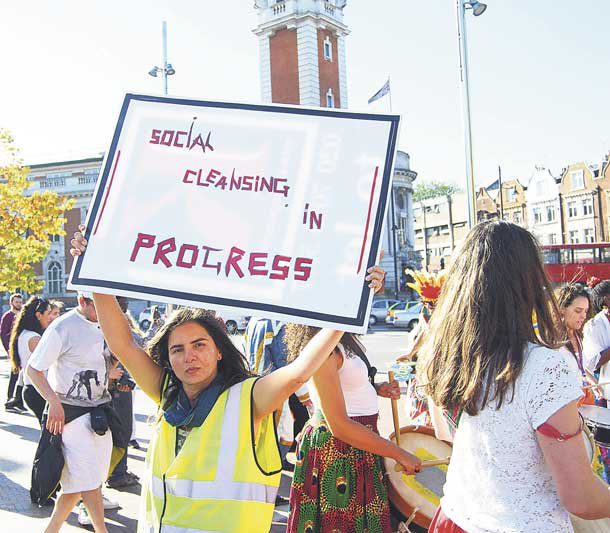 Andrew Edelston bought a flat in Brixton four years ago with his wife Polly and loves living in the area – but, he asks, what does he have to do to call himself a local?
Andrew Edelston bought a flat in Brixton four years ago with his wife Polly and loves living in the area – but, he asks, what does he have to do to call himself a local?
I would never hit a child, but when a middle class six-year-old girl wearing wellington boots parades a “yuppies out” placard in your face, it’s hard.
Having bought a flat in Brixton four years ago, I still consider myself relatively new to the area and am no doubt the focus of this little girl’s fury.
Walking past boarded up delis and fish shops I feel guilty, stopping to read the graffiti thinking, “is this my fault? What can I do to help change this situation? Who do I know that would like a wig?”
Realising that I’m not going to buy a second hand fridge, it’s clear that some of these shops aren’t for me. But they’re not for this little girl or her parents either.
Many of the protesters so angered by the gentrification of the area are the very people who set it in motion – people who bought flats and houses in the area during the 90s and early noughties because it was what they could afford at the time.
These are the people I bought my flat off and the ones who have most benefited from the area’s gentrification.
The fact that they were stepping stones to this gentrification didn’t seem to bother them then. They now feel they’ve earned the territorial right to shut the door to anyone else who may want to benefit from the same opportunity.
They believe enough time has passed to forgive the social transgressions they purport to want rid of and claim the right to call themselves local. So when can I do the same?
What does it take and how long before you can call yourself local? Before you can pour your own self-righteous scorn on the next wave of gentrifiers?
As Hackney film maker Benedict Seymour described in his article “Shoreditch and the creative destruction of the inner city” which I only read for purposes of writing this, “Each wave of colonisers plays out the contradictions of their particular claim to space, taking sides against the next phase of gentrification in which they nevertheless conspire”.
Once you’re in, it’s only human nature to protect your interests and those of your friends and neighbours.
What does jam in the throat is when you then turn around so self-righteously and say, no more!
Maybe it’s a way to distance yourself from gentrification and solidify your status as a local community member. Maybe it’s a way to alleviate some of the guilt you feel for doing exactly the same thing. I can understand that feeling.
I look forward to the time I can shop in Brixton and not feel that people think I’m condescending when I genuinely would like to buy a scotch bonnet pepper.
But asking oblivious children to act as sandwich boards for your own hypocrisy… I can’t see that I would ever stoop so low.
I for one would never want my kid to be the standard bearer for beliefs they couldn’t possibly understand, and I certainly wouldn’t want them getting punched.
Perhaps Brixton has, in fact, now hit a perfect equilibrium and any further influx of wealth will ruin the place.
It’s an easy position to take when you’re the one benefiting from the presumption.
But you can’t freeze a place in time when it best suits you.
A certain amount of change is inevitable. It’s how you manage that change that is the issue.
It’s a very complex situation that I certainly don’t fully understand, but local and national government, policy makers, seem like a better focus for energy. Telling the next generation of yuppies to piss off is, at best, misguided and when delivered by their predecessors, hypocritical in the extreme.
I love living in Brixton and would like to, if not now, at least one day, consider myself a local. Until then I will continue to contribute to the local community and look forward to the day that I don’t feel guilty for moving here.
What I won’t do is wheel my children out waving placards, lambasting people for doing the exact same thing I did to help me feel that quicker.




As someone born and bread
its all conjecture how does he know that the kid is middle class did he talk to the parents?
moist likely not
with that kind of attitude he wont ever be a ‘Brixton local’ he will always be a ‘yuppie’
and to be honest if he cant see that he with that attitude is part of the problem then he should sell up and move someplace else
Agreed Buster – you certainly can’t freeze a place in time when it suits. Hopefully you will remember your comment if Brixton undergoes a rapid change that you don’t necessarily appreciate in the future.
What is unfortunate about this article is the fact that the author makes a casual comment stating that he would never hit a child but that it’s hard to restrain himself when the child is carrying a ‘yuppies out’ sign. What kind of clumsy, bulls**t analogy is this?
If you want to make your point, make your point. But does use a throwaway comment about hitting a child to put it across. If the author thinks this is appropriate then maybe he is the kind of resident Brixton doesn’t need.
I don’t think this is a measured article. I think it’s all about people who’ve bought property, whether now or years ago. The issues of gentrifcation are much more destructive to renters. Social housing tenants are forcibly removed for demolitions and so-called regeneration of estates. Private rents just go up and up and those on ordinary incomes have to leave.
This article is ful of misplaced resentment. The protesters for whom this really all matters are the property have-nots. They aren’t people who bought years ago. We never had the money to buy property ever. The writer is just exhibiting their own prejudices. It might be distasteful to see a 6 year old at a protest with a placard they probably do not fully understand, but you can’t know that girl’s circumstances because she was wearing Wellington boots. Would she have been more credible in Nikes? You are right that the problem is government more than the “yuppy” next door, but why do entitled people always say “I love Brixton, so why doesn’t it love me”. Why do you assume your right to be loved? People with more immediate worries don’t go on about wanting the area to love them. And this gulit you feel. That too is a luxury. There are people in Brixton more concerned about being hungry than guilty.
good article, you will bump up against moments of friction continually in brixton, because thats brixton. head up to streatham and you will find less anger, less friction. Being a local is in part when you accept this as the timbre of the place. being a local is in part when you get of the sofa on a saturday morning because you have to help a fellow local build something, clear something or stand up for something local. What is sad and challenging at the moment here is that those we are fighting against are in the majority the council and the large landlords that are designing and pricing their properties or planned properties for the people arriving and explicitly not for those that are already here. what your article seems to be unaware of is that so much of the improvement in the area has come from the word local being a verb! The park was made beautiful with the help of volunteers, same for the windmill and so much else. Once made beautiful and pleasant we often feel that this has only attracted a new boozey, loud and ignorant influx of people that through no fault of their own are forcing us out. They have more money than us, so the prices of everything go up. What are we to do, move to another area, work on improving that until those same eyes start to look at our streets and start pushing us out again? It is not you that needs to feel guilty, but those that serve and make money from you, those that follow are creating a brutal experience where you are conitunally meeting friends who are leaving cos their rent just went up 50%-100-300%.
An extremely measured write up. And totally spot on.
‘You can’t freeze a place in time when it suits you’.
File under: “I’m not going to feel guilty about my privilege so ner”
Nothing like a white whine on a summers evening.